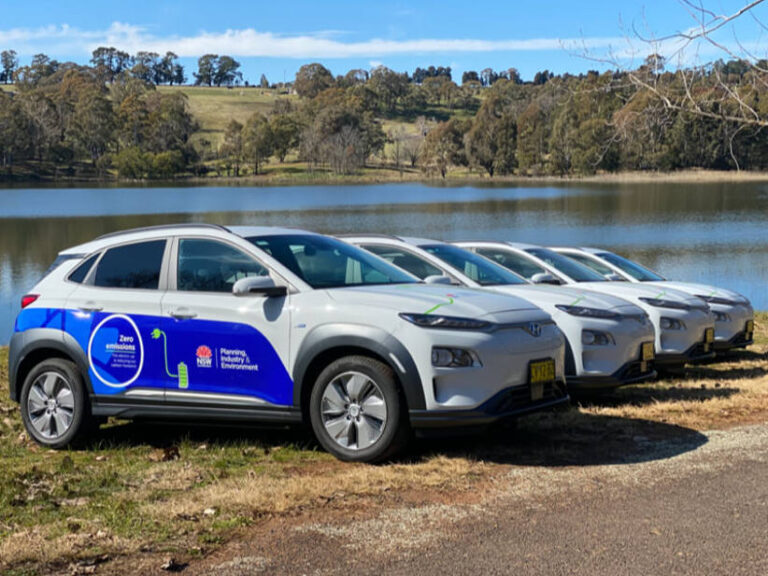Businesses in NSW can now make decisions about electric vehicles for their fleet after the recent budget announcements by the NSW government. The long term roadmap provides stability and confidence so Fleet Managers can recommend investments in electric vehicles and infrastructure to senior management. It has given Fleet Managers the chicken, so they can now start laying the eggs.
In the budget announcement there is free stamp duty and rebates for electric vehicles from 2021. They have committed to investing in charging stations throughout the state with clear guidelines on the distance between charging locations in metro and rural areas.
A timeline for road user charges was also announced which provides the missing link for fleets and industry suppliers. From 2027 (or earlier if EVs really take off) a road user charge will apply to electric vehicles in NSW.
The NSW Government has nominated 1st September 2021 as the start date for the free stamp duty and EV rebates so fleets can order early. The start date for new road user taxes in 2027 allows fleets to forecast running costs and future residual values with confidence.
To lead the way and create a used car market, the NSW Government has set a target to convert its passenger fleet to fully electric (where its fit for purpose) by 2030. This will probably make their Fleet Manager, SG Fleet, the biggest buyer of electric vehicles in Australia.
Vehicle manufacturers can plan new products launches and forecast demand for existing EVs knowing fleet customers have a roadmap for electrification and an exit strategy that will amplify consumer acceptance once EVs hit the used car market.
Several manufacturers announced their support for the NSW government budget program while working out what their share of the 25,000 vehicles will be.
“Volvo applauds the NSW Government’s electric vehicle reform package. It is a significant step in the right direction to increase penetration of electric vehicles in Australia, which is lagging the rest of the developed world on uptake,” said Volvo Car Australia Managing Director, Stephen Connor.
“Volvo firmly believes there is no long-term future for cars with an internal combustion engine. Therefore, Volvo is committed to become a fully electric car company by 2030 and becoming a leader in the fast-growing premium electric car market.
“In less than a decade we intend to only sell fully electric cars and, phase out any car in our global portfolio with an internal combustion engine, including hybrids.
“This will allow us to meet the expectations of our customers and be a part of the solution when it comes to fighting climate change. Other car makers have announced similar plans.
“We urge the federal government, and other states and territories, to recognise this reality, and fast track their electric vehicle strategies. This is crucial to ensure Australia does not lag behind the global car market which is responding to the seismic technological change that is underway,” Mr Connor said.
Stephen Lester, Managing Director of Nissan Australia said: “It is extremely encouraging to see the NSW Government’s strong leadership in the EV space. These decisive actions are good for consumers, good for the market and ultimately good for the State’s own legislated net-zero targets. These types of policies not only accelerate the EV transition right now, but also put Australia in a stronger place for priority adoption of new vehicle technologies, sooner.
“Additionally, with the announced transition targets for its own fleet, the NSW market will see greater EV uptake because of Government purchases, but also will ultimately benefit customers by providing a vibrant second-hand EV market in the years to come.
“The announcement of upcoming EV-related taxation reform provides consumers the right balance between EV adoption today, and surety about the future regulatory environment.”
Nissan welcomes the opportunity to work with the NSW Government to finalize the implementation details and operational processes in preparation for the 1st September 2021 implementation date.
Nissan has the largest EV dealer network in Australia, with 92 outlets nationally, with 22 located in NSW, providing full sales and servicing support. Today’s announcement reinforces the investment made by both Nissan and its dealer partners to the training and expansion of EV dedicated facilities, along with fully trained staff to support buyers to transition to EVs.
Environmental groups were also supportive of the announcement and can now focus their efforts on the Federal government to introduce a consistent national approach and streamline the collection of a road user tax for fleets.
“It’s fantastic to see the NSW Government taking ambitious action to accelerate clean transport, said Solar Citizens’ National Director Ellen Roberts.
“Helping drivers switch to electric vehicles is crucial for NSW to reach net zero emissions by 2050, as transport emissions are rising rapidly.
“Electric vehicles can run on cheap renewable energy and don’t produce pollution that harms our health and drives climate change. EVs can also provide valuable grid services by soaking up excess solar during the day and feeding it back into the grid when it’s needed.
“A policy vacuum has kept electric vehicles out of reach for many Australians.
“The NSW Government’s electric vehicle strategy shows it’s serious about tackling transport emissions. Introducing a $3,000 subsidy and deferring road user charges will help make electric vehicles more affordable for all drivers.
“Now we’d like to see other states and the Federal Government follow the lead of NSW and introduce these kinds of sensible and forward-thinking policies to encourage EV uptake”






